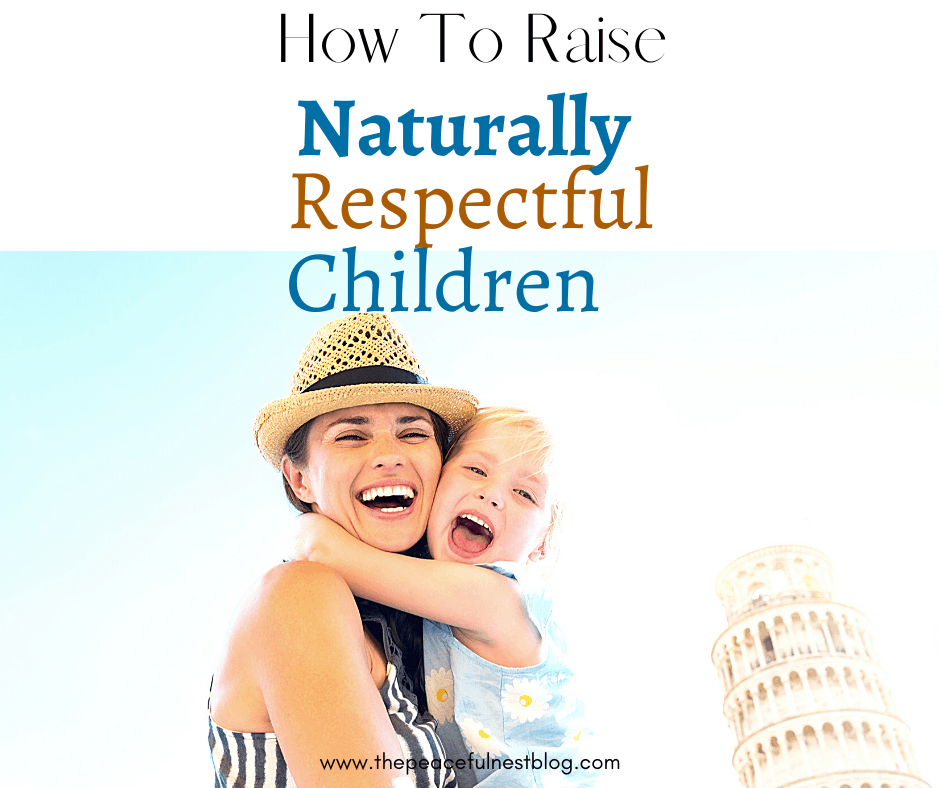Why is respect important?
Being a respectful person is highly valued. It is important that we learn how to treat people with respect even if the person is different than us or has different views. You can start raising naturally respectful kids today.
Being around a respectful kid is much different than being around a disrespectful child. Being around a respectful adult is also much different than being around a disrespectful.
Ask yourself would you rather be in the presence of a respectful person or a disrespectful person?
Being respectful doesn’t mean that you are a doormat and let other people treat you badly. It simply means that you treat another person with humanity.
Can kids learn at a young age to be respectful?
Kids can definitely learn to be respectful at a young age. It’s actually important to start teaching your child to be respectful at a very young age. Because the habits we have in our lives are either good habits or bad habits. And when we have a habit in our life it is difficult to break, even if it’s a bad habit.
Where does learning respect come from?
We learn respect from the people that we keep company with. In a child’s case, this is their parents and their family. We learn by living life, society, and those we are around all the time how to treat people with humanity. We also learned this from the shows we watch, the media we consume, and the influences we are allowed in our lives. If we allow influences that show disrespectful kids or people in our child’s life they may start to pick up bad habits.
Everything is learned typically in the family home and dynamic. Good and bad. It is our jobs as moms to teach our children the right way to treat other people.

13 Ways to Raise Naturally Respectful Kids
Start At Home
Anything that you want to teach your child should always be started at home. The reason is that for the first several years of your child’s life you are the biggest influence. Whether you want them to or not your child will pick up your habits.
This means if you are a disrespectful person to your spouse or even to them or to your family members your child will see this and they will start to pick up those habits. The reason is that they believe this is the right way to treat other people. Yes, it’s important to put up boundaries especially if you have somebody in your life who oversteps. But there are ways you can respectfully set up boundaries and still notice a person’s humanity.
Your child is watching you all the time. Yes, it’s not always fun but it’s important to acknowledge that those little eyes see almost everything you do.
Model Respect When Interacting With People
As I said earlier you can model respect for other people even if you disagree with them. Yes, there are times in life you will have to stand up for yourself. You can use those moments with your children around or even when they’re not to show constraint and self-control when interacting with other people.
Being right is not always the most important thing. How you treat someone and how respectful you are to them will be noticeable to your children. This will help teach them that even if we disagree with somebody this doesn’t mean we don’t like this person, we can still set boundaries and stand up for ourselves in a respectful, kind manner.
Show Your Child Respect Too
Children are people. They deserve respect just like you. Yes, they learn how to be respectful to their parents, their grandparents, and other authority members by being taught manners at an early age. But you can also show your child respect.
You can do this by being mindful of their thoughts, space, and ideas.
Ask Your Child Their Thoughts on Something
Children have their own thoughts and ideas about things. You can help them develop these thoughts and ideas by asking them questions. Instead of telling your child how to feel about a certain subject or topic ask them how they feel and accept their answer even if it is different than yours.
This will help your child learn how to develop their own ideas and realize that people can still love each other, have differing opinions, and be respectful of those opinions. Chances are your opinions and thoughts on something may develop and so will your child’s as they grow. Do not demand that your child thinks exactly like you about something. Be open to their thoughts on things and help them learn along the way.
Don’t Force Your Child to Show Affection
This is a big one. There are some people who are not touchy-feely people. And that is OK. You can help your child learn how to show affection to the ones they love without giving physical affection if they don’t want to.
Being respectful of your child’s choice not to hug somebody will give your child authority in owning their own body. It will help them realize that they do not have to do something physically just because they think it’s expected of them.
Let Your Child Answer Questions Themselves
When your child is asked something sometimes it’s easy and tempting to want to answer for them. This is especially true if your child is more apprehensive and on the quiet side. But we can give our children authority and teach them how to be respectful when someone is speaking to them by allowing them to answer the questions themselves.
Let your child form their own thoughts and ideas on how to answer these questions even if it’s not what you would say. Let them speak for themselves. This gives them the courage to also speak up. You can encourage your child to be respectful when someone is speaking to them by gently saying “so and so asked you a question honey can you please answer it or something along those lines.”
Start Teaching Manners Early
Manners are a big deal. Have you ever been around somebody who does not have any manners? It can be frustrating to try to hold a conversation with someone who does not have any manners or someone who is disrespectful to another person.
Start young by teaching your child manners. This does not have to be anything big it can be something as simple as cleaning up after themselves at the dinner table, saying please and thank you, blowing their nose correctly, say excuse me, etc, etc. Children will need reminders. So when you’re in the process of teaching them manners be prepared to tell them over and over and over again. Eventually, these manners will start to just click.
Teach Awareness of Other People Early On
Humans are innately self-centered. Children are no different. If we allow our children to cultivate self-centeredness then they will have trouble being aware of other people as they grow. But you can teach awareness of other people early on.
You can do this with your child by helping them look outside of themselves and try to put themselves in someone else’s shoes. For example, say your child is playing with the blocks and they have been playing for a long time but you notice that their sibling really wants to turn. Instead of just saying “share” maybe try saying something like this to your child: I know that you really like playing with the blocks, the blocks are really fun to build with. I believe that your sister also likes playing with the blocks. What do you think?
This helps your child take their focus off of them and what they want to do and notice what their sibling likes as well. This may lead them to invite their sister or brother to play with them or letting their sibling have a turn on their own. There are several ways you can practice this during several different circumstances. You just have to be mindful of these circumstances when they present themselves.
Give Your Child Your Full Attention
I think one thing we struggle with as an adult is dividing our attention. It’s easy to be on our phone, focused on work or what tasks we need to do but when your child is talking to you or if they want to spend time with you try not to divide your attention between them and whatever else your mind is on. Give them your full attention.
This will help teach your child that when someone wants your time then it is the respectful thing to do to give them your full attention.
Teach Your Child Empathy Early On
Being empathetic is more natural to some people however it’s still a learned trait. Being able to put yourself in someone else’s shoes and have empathy for their situation even if you’ve never experienced it is important in today’s society.
Don’t be afraid to talk about issues in the world with your children. Don’t be afraid to talk about homeless people or situations where somebody is being discriminated against. These situations can help teach empathy and let your child learn how to put themselves in a situation they’ve never been in and think about how another person may be feeling.
Work on Self-Control Daily With Your Child
Self-control takes work. Even as adults we struggle with self-control sometimes. Teaching your children self-control early on can be beneficial to them. This is because it helps teach your child to learn that not everything is about them. They can learn to control themselves in social situations where they’re not happy.
Set Boundaries
Setting boundaries with your children is a must. Teach them early on that there are certain ways to speak to people, not to interrupt conversations, etc. This will help your child naturally develop respect.
Be Consistent
Stay consistent with your rules and boundaries. When you expect something from your child, don’t give in sometimes just because it’s easier. Remember you are shaping little hearts and minds.
Why do we need more respectful people in the world?
Being respectful of other people should be a trait everyone has. Unfortunately, this trait has gone to the wayside too often. We have replaced respect for others with self-centeredness. It is possible to be respectful of another person’s humanity even if you do not agree with everything they think or say. This starts first at home.
Why should we be consistent with teaching our children how to be respectful?
One typically only learns a habit by it being repeated over and over. This is why consistency is key when it comes to raising children.
One friend once told me “add ten years to your child’s behavior” is it cute or appropriate then? If not then you need to start working on it now.
Habits have a way of sneaking into our lives without us noticing. Our children are no different.
If you are new to the Peaceful Nest Blog, welcome!
Be sure to read my top posts on parenting:
- Why Consistent Parenting Matters
- 12 Habits of Immensely Peaceful Moms
- 63 Mom Hacks That Are Pure Genius
- Connect With Your Child and Build Up Their Heart
Are you looking for ways to become a peaceful mom but you aren’t sure how?
I created a free planner for moms like me, who want to create a peaceful home but let the stress of never having it all together defeat them, because whoever has it together? The best we can do is a plan for peace and roll with the punches, right? If you want your free planner you can get it here!
Are you looking for a mommy tribe?
Our Facebook group, From Chaos to Calm, is full of encouraging and supportive moms just like you. We would love to have you join us! Join From Chaos to Calm Mom group on Facebook.
Don’t forget to follow The Peaceful Nest on Facebook and Instagram!
And remember, sharing is caring! Share this post on Pinterest below!

Hi there, I’m Jenna! I am a devoted mommy and wife. As well as an advocate for children and creating a peaceful atmosphere for those we love. I co-wrote Faith Actually: Living Life After Tragedy with my husband. I have my Bachelor’s Degree in Biblical Studies and currently working toward my Master’s in Positive Psychology. My number one desire is to create a peaceful home life for my family. My second desire is to share with you the tips I learn along the way!

